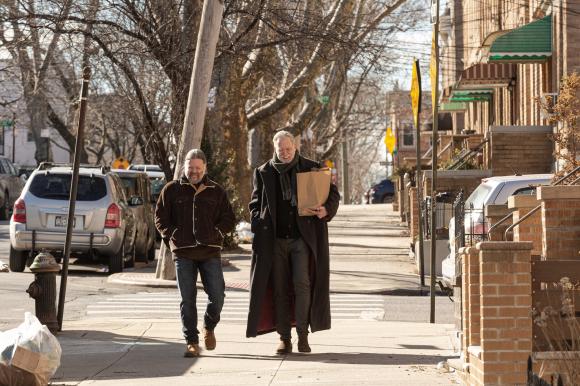After the premiere. From Manifesto to Life (“The Writer”)

Sometimes, when you are overwhelmed by despair that no one around you can hear what is being said, you need to raise your tone, speak loudly, in choppy tones, in manifestoes, patiently and at length, like with small children. All the films made so far by the director-producer Romas Zabarauskas are like manifestations. However, in his latest film, The Writer (2023), the director softens his tone. It is obvious that he has finally been heard, so he can speak more calmly and quietly.
“The Writer” is the fourth film by Romas Zabarauskas. “Porno melodrama” (2011) was the first true LGBT film made in Lithuania and selected for the Berlinale Panorama programme back then.
The story takes us to a New York City apartment, where former lovers meet after many years. Kostas (Bruce Ross), who left Lithuania after it regained its independence to study in the USA, and Dima (Jamie Day), a Lithuanian of Russian origin. These men had met and fell in love in the 1970s in the Soviet army. But Lithuania's freedom drove them apart – while Dima moved to Lithuania, Kostas sacrificed his lover for an even freer life and broader prospects. Kostas, now a renowned writer, has published an autobiographical novel based on the separation of lovers. After reading the book, Dima arrives in New York, ostensibly for a job interview, but the purpose of his trip is completely different.
The director and the entire crew (from the screenwriters to the editor) have chosen the most challenging genre of all – a chamber mellowdrama with two characters, which means that the entire weight or the film's emphasis is placed on acting and dialogues. After three decades, Kostas and Dima certainly have a lot to talk about, but their conversations have to involve the viewer too, so it's no surprise that the script was written by four people - Zabarauskas himself, Scotsman Mark David Jacobs, Artūras Tereškinas and Anastasia Sosunova.
Initially, the lovers, who are in their fifties, talk about anything except feelings. Their conversations could be described as small talk, avoiding serious and painful topics, so Dima is busy critiquing Kostas' book and refining the details, while Kostas is cooking borscht and retorting back at Dima. No matter what they talk about, the two men keep bantering each other. When they talk about roots, they discuss Russian culture, patriotism, guilt over choices, the concept of martyrdom, they accurately ridicule the Western left, which to this day do not distinguish communism from socialism, they criticise not only the radical right, but also the left alike. Both Kostas and Dima feel partly like what Julia Kristeva wrote about in her book “Strangers to Ourselves” (first published in French in 1988). For Kostas, being Lithuanian in New York means the same as being American in Lithuania. Dima despises his roots altogether, and, in the context of today's war, tries to completely erase his Russian identity and considers himself a great Lithuanian patriot and a devoted Lithuanian.
According to Zabarauskas, having seen many films by Éric Rohmer, Alain Resnais, Agnès Varda, Ingmar Bergman, John Cassavetes, and having taken Louis Malle's film “My Dinner With Andre” (1981) as a point of departure, he wanted to explore the art of conversation. To reflect on what defines and shapes us, whether the political context influences our sexual choices and beyond.
Although the narrative is smooth, there are occasional stumbling blocks, too much declarativeness and the same melodrama in conversations on certain topics; too many dots at the end of a sentence (of the film). However, the half-tones, the subtle nuances, the non-judgemental gaze that appear in the film, are commendable, because life itself is never dual. The cinematographer Narvydas Naujalis has done a great job, his lighting is so New York, and the music by Ieva Marija Baranauskaitė associates with Woody Allen's jazzy New York.
Romas Zabarauskas should dare to relax more often, to be more self-confident, and maybe one day we will see a Lithuanian variation of "Happy Together" (directed by Wong Kar-wai, 1997) or “Brokeback Mountain” (directed by Ang Lee, 2005).